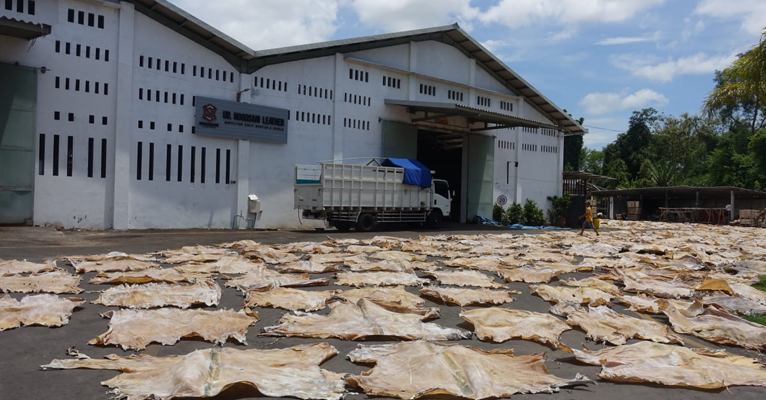Masih membahas tentang bagaimana strategi scale up bisnis di era disrupsi menjadi tantangan bagi IKM…
Initiation of Making Indonesia 4.0: Strategic Policy for National Industry Competitiveness

The definition of strategic policy will vary, especially in the context of government policy. According to Rod Lyon (2015), strategy is a set of actions with a specific purpose and scope decided by decision-makers/leaders to obtain long-term benefits. The metaphor of strategic policy is solving puzzle games from at least 3 perspectives: first, how to understand the environment; determine the position and role in global and regional competitions, and acknowledge the set of constraints that bind these roles and positions.
What about the competitiveness of the national industry? The Ministry of Industry as one of the main actors in making industrial policies sees the importance of industrial competitiveness as the main motor of the economy. Increasing the competitiveness of the manufacturing industry must be supported by industrial human resources and technological infrastructure. So that in order to boost the competitiveness of Indonesian industry and benefit from changes in the global system in this modern industrial era, the Minister of Industry initiated the strategic policy Making Indonesia 4.0 as a leadership breakthrough in an effort to strengthen industrial competitiveness.
The phenomenon of Industry 4.0 (4IR) is already in front of national industry players. There will be a fundamental change in the structure of the national industry and currently, 4IR has become a national agenda in order to increase the nation's competitiveness. Indonesia is one of the strongest market economies in the world with a population of close to 270 million. All global economic forces are focused on Indonesia as an abundant market as well as a source of competitive productive labor. With the contribution of labor absorption of up to 14 million and strong national consumer spending in the future, Indonesia will become one of the world's economic powers that change from natural resource-based to value-added sector-based.
The era of economic globalization has brought a very rapid renewal and has a broad impact on the economy, both nationally and internationally. The impact that is being felt the most at this time is the increasingly fierce competition in the industrial world. For this reason, the industrial sector must be able to develop in the competitive arena and at the same time make it a driving force for the national economy in the future. To build sustainable competitiveness, efforts are needed to utilize all the potential resources and capabilities possessed to take advantage of outside and within the country's opportunities.
Returning to the concept of strategic policy, namely the perspective of how to understand the environment in this global competition, the Ministry of Industry sees that industrial revolution 4.0 has the potential to overhaul the industry as well as the social order. For Indonesia, this is an opportunity to increase global market competitiveness, and the implementation of Industry 4.0 adds to Indonesia's optimism toward a solid industrial country by 2025.
For the national industry, the industrial 4.0 phenomenon adds to the list of opportunities to revitalize the manufacturing industry sector and become one of the strategies to accelerate Indonesia's vision to become the 10th largest economy in the world. In 2016, the manufacturing industry contributed 20 percent of GDP and more than 14 million jobs were absorbed. Currently, Indonesia is also enjoying a period of demographic bonus, thanks to the large population of young people who are in the productive range which is expected to increase by 30 million by 2030. So it is important for the government to provide job opportunities.
The second perspective is that Indonesia's national industry will determine its role in global and regional competition. Industry 4.0 opens opportunities to revitalize the national manufacturing industry, increase productivity, encourage export performance and open up about 10 million new jobs. In determining its role in global competition, it is very important to formulate the Making Indonesia 4.0 policy initiative in order to strengthen the role and position of the desired industry as follows;
• To become the world's top 10 economic powers based on GDP
Indonesia is committed to becoming one of the top 10 world economic powers based on GDP in 2030. Why is that? So far, Indonesia has achieved GDP growth at position 16 in 2016 supported by strong domestic consumption and investment needs.
• Doubling the ratio of productivity to costs
Productivity is a priority for the manufacturing industry, so Indonesia should focus on increasing the output of current labor costs. The goal is to multiply productivity and sustainable profits.
• Encouraging export performance to be 10% of GDP
Export performance is also an important note for the manufacturing industry. The decline in net export performance against GDP is the main note. With this policy initiative, the national industry is targeted to be able to increase global and regional market share, be able to provide jobs, and restore the achievement of 10% of net exports of GDP by 2030.
• Allocate 2 percent of GDP for research and development
The importance of research and development activities for the capacity of a nation has been proven by many developed countries. Through industry 4.0, the commitment to become advanced and capable is also getting stronger. With sufficient budget commitment, innovation, design, and research will increase mastery of technology, where technology infrastructure is an important element in the implementation of industry 4.0.
The final perspective in strategic policy is to identify the obstacles that will be encountered to achieve the targeted roles and positions in the Making Indonesia 4.0 initiation. Currently, almost all national manufacturing industries face their challenges. Starting from the availability of raw materials in the domestic market to the alignment of industrial policies. Facing these challenges will certainly be cross-sectoral and cannot be resolved by the Ministry of Industry itself. Therefore, it is necessary to formulate the national initiative Making Indonesia 4.0 in facing these challenges;
• Improvements in the flow of goods and materials
It must be admitted that in some manufacturing sectors, the national industry still relies on high-value raw materials and components, such as the chemical and electronic sectors. By strengthening the upstream sector industry, it is hoped that an increase in added value and production capacity can be achieved.
• The redesign of industrial zone
Indonesia's industrial zones already have some integrated industrial zones, but what needs to be improved is the alignment of industrial zones with industrial policy 4.0.
• Accommodating sustainability policy standards
One of the issues in the sustainability industry today is an industry based on clean technology, electric vehicles (EV), biochemistry, and renewable energy. Its mission is to how the national manufacturing industry sector promotes environmentally friendly, conducive, and environmentally friendly investment.
• Empowering small and medium industries
The backbone of the national economy is small and medium industries (IKM). Industry 4.0 policy will focus on building an e-commerce platform for SMEs, building technology centers for easy access for SMEs to technology, and providing support for innovation.
• Building a national digital infrastructure
To accelerate the Making Indonesia 4.0 roadmap, the government's focus is on accelerating the development of digital infrastructure and high-speed internet. Government, private and public cooperation to invest in big data technology, the internet of things, and cyber-physical system (CPS) will encourage collaboration and accelerate organizational transformation.
• Attracting foreign investment
The technological gap is certainly still there and is a common challenge. A must involve many industry players to transfer technology to local industries to increase economic added value.
• Improving the quality of industrial human resources
Making Indonesia 4.0 places industrial human resources as the main actor in driving the industry. Curriculum alignment is the main collaboration agenda with stakeholders, especially regarding the education agenda.
• Development of an innovation ecosystem
A healthy and conducive industrial ecosystem will spur productivity and innovation. The innovation ecosystem is important to ensure the successful implementation of industry 4.0 in various national industrial sectors.
• Incentives for technology investment
One strategy to stimulate the investment industry is the existence of incentive policies from regulators (eg taxes, export/import facilities, guaranteed labor incentives). This effort will increase the competitiveness of the national industry during competition and rapid change.
• Harmonization of rules and policies
Coordination and collaboration are still a priority agenda for regulators and industry to be resolved together. The commitment to harmonize policies and regulations that are considered to be hampering the development of the national industry will be reduced and adjusted.
From the three strategic policy perspectives described above, the initiation of the Making Indonesia 4.0 policy requires leadership commitment, especially the regulator, in this case, the Ministry of Industry. Improving the competitiveness of national industries requires a leadership vision that can harmonize cultural change and social change. Industrial culture is very important for Indonesia in the initiation of Making Indonesia 4.0. Industrial culture shapes industrial societies to be better prepared to adapt to a competitive industrial ecosystem. Likewise, the social aspect of society must be prepared to support an open and collaborative industrial society.
Alfiyan Darojat – BPIPI
(function(d, s, id) {
if(d.getElementById('fb-root')) return;
var fbRoot = d.createElement('div');
fbRoot.id = 'fb-root';
document.getElementsByTagName('body')[0].appendChild(fbRoot);
var js, fjs = d.getElementsByTagName(s)[0];
if (d.getElementById(id)) return;
js = d.createElement(s); js.id = id;
js.src = "https://connect.facebook.net/en_US/sdk.js#xfbml=1&version=v2.12";
fjs.parentNode.insertBefore(js, fjs);
}(document, 'script', 'facebook-jssdk'));




This Post Has 0 Comments